中考英语听力常考话题(精确整理)
中考英语听力常考话题(精确整理)

中考英语听力常考话题一、30句日常用语1. A: Hi! / Hello! 你好!B: Hi! / Hello! 你好!2. A: Nice to meet you. 见到你很高兴。
B: Nice to meet you too.见到你我也很高兴。
3. A: How are you? 你好吗?B:I am fine, thank you. How are you?(And you?)我很好,。
4. A: Good morning? B: Good morning! 早上好?早上好!5. A: Good afternoon? B: Good afternoon! 下午好?下午好!6.A: Good evening? B: Good evening!晚上好?晚上好。
7. A: Good night!晚安。
B: Good night! 晚安8. A: What is your name? 你叫什麽名字?B: My name is Lisa.9. A: How old are you? 你几岁了?B:I am fourteen years old.我十四岁。
10. A: How tall are you? 你有多高?B:I’ m 1.65metres.我身高1米5511. A: How heavy are you? 你有多重?B:I’ m 48kilograms.我有48公斤。
12. A: When is your birthday? 你的生日是什么时候?B:My birthday is in May.我的生日在五月。
13. A:When do you get up?你什么时候起床。
B: I g et up at 7:00 o’clock.我7点起床。
14.A:When do you do morning exercise? 你什么时候做早操?B: I usually you do morning exercise at 8:30.我通常在8:30做早操。
北京市中考听力常考话题
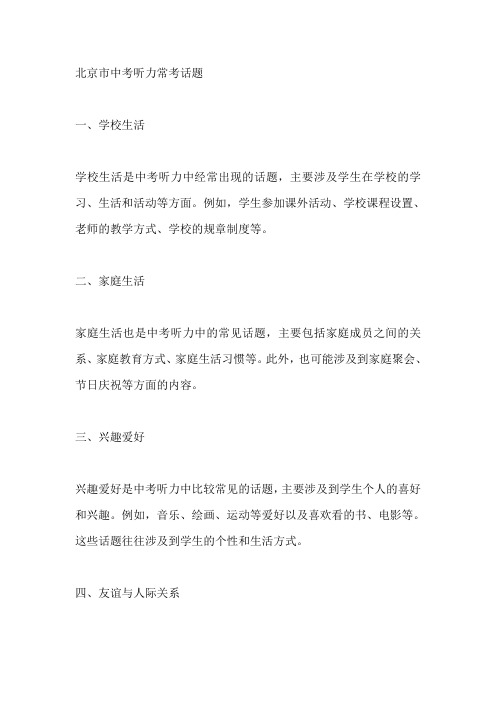
北京市中考听力常考话题一、学校生活学校生活是中考听力中经常出现的话题,主要涉及学生在学校的学习、生活和活动等方面。
例如,学生参加课外活动、学校课程设置、老师的教学方式、学校的规章制度等。
二、家庭生活家庭生活也是中考听力中的常见话题,主要包括家庭成员之间的关系、家庭教育方式、家庭生活习惯等。
此外,也可能涉及到家庭聚会、节日庆祝等方面的内容。
三、兴趣爱好兴趣爱好是中考听力中比较常见的话题,主要涉及到学生个人的喜好和兴趣。
例如,音乐、绘画、运动等爱好以及喜欢看的书、电影等。
这些话题往往涉及到学生的个性和生活方式。
四、友谊与人际关系友谊与人际关系是中考听力中经常出现的话题,主要涉及学生之间的交往和人际关系。
例如,友情的发展、人际关系的处理、合作与竞争等方面。
这些话题能够反映出学生的社交能力和价值观。
五、节日与庆祝活动节日与庆祝活动是中考听力中的常见话题,主要涉及到重要的节日和纪念日。
例如,春节、中秋节等传统节日以及一些国际节日,如圣诞节等。
这些话题可能涉及到节日的文化背景、庆祝方式以及传统习俗等方面。
六、旅游与自然风光旅游与自然风光是中考听力中的常见话题,主要涉及旅游经历和自然景观。
例如,旅游景点介绍、旅游计划安排、自然风光的描述等。
这些话题能够反映出学生的视野和审美能力。
七、文化传统与风俗习惯文化传统与风俗习惯是中考听力中的常见话题,主要涉及民族文化和传统习俗。
例如,传统节日的来历、民族服饰的特点、传统手工艺等。
这些话题能够反映出学生对传统文化的了解和尊重。
八、环保与可持续发展环保与可持续发展是中考听力中的新兴话题,主要涉及环境保护和可持续发展的理念和实践。
例如,垃圾分类、资源回收利用、绿色出行等方面。
这些话题能够反映出学生对环境保护的关注和责任感。
九、社会问题与热点话题社会问题与热点话题是中考听力中的常见话题,主要涉及当前社会关注的热点问题和事件。
例如,教育改革、就业问题、社会公平正义等。
这些话题能够反映出学生对社会问题的关注和思考能力。
2024年北京九年级中考英语听力常见话题高频词汇和表达梳理
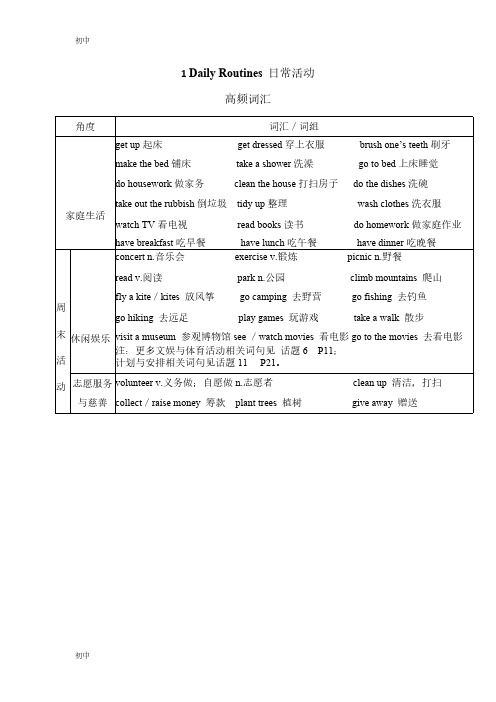
1 Daily Routines日常活动高频词汇角度词汇/词组家庭生活get up起床get dressed穿上衣服brush one’s teeth刷牙make the bed铺床take a shower洗澡go to bed上床睡觉do housework做家务clean the house打扫房子do the dishes洗碗take out the rubbish倒垃圾tidy up整理wash clothes洗衣服watch TV看电视read books读书do homework做家庭作业have breakfast吃早餐have lunch吃午餐have dinner吃晚餐休闲娱乐concert n.音乐会exercise v.锻炼picnic n.野餐read v.阅读park n.公园climb mountains 爬山fly a kite/kites 放风筝go camping 去野营go fishing 去钓鱼go hiking 去远足play games 玩游戏take a walk 散步visit a museum 参观博物馆 see/watch movies 看电影go to the movies 去看电影注:更多文娱与体育活动相关词句见话题6 P11;计划与安排相关词句见话题 11P21。
周末活动志愿服务与慈善volunteer v.义务做;自愿做n.志愿者clean up 清洁,打扫collect/raise money 筹款plant trees 植树give away 赠送常用表达家庭生活1.---What do you do in the evening?你晚上做什么?---I do my homework at about five thirty,and I eat dinner at seven fifteen.我大约五点半做作业,七点十五分吃晚饭。
2.---Eric,could you please do the dishes and take out the rubbish?埃里克,你能不能洗碗和倒垃圾?---Why don’t you do them by yourself? Can’t you see I’m cleaning the room?你为什么不自己做呢?你看不出来我正在打扫房间吗?周末活动3.---Did you and your family go camping last week?你和你的家人上周去露营了吗?---Yes,we went there and took many beautiful photos.是的,我们去了那里并且拍了很多漂亮的照片。
[精]2020近三年中考英语听力最常考话题-全
![[精]2020近三年中考英语听力最常考话题-全](https://img.taocdn.com/s3/m/0db6739be87101f69f319595.png)
近三年中考英语听力最常考话题全一.常考句型二、常考话题(Topics)Topic1 问路与交通经典例句(问路)1.Excuse me.Is there a bank near here?打扰一下,这附近有银行吗?2.Which is the way to the supermarket?请问哪一条路是去超市的?3.Do you know the way to Bridge Street?你知道去布里奇大街的路吗?4.Would you please tell me the way to the bank?请问你能告诉我去银行怎么走吗?5.Could you tell me how I can get to the hotel?你能告诉我如何去旅馆吗?(指路)1.Yes,there is.It's on Center Street.是的,有。
在中心街。
2.It's in front of the library.它在图书馆前面。
3.Go down this street.沿着这条街走。
4.Turn left at the first crossing.在第一个十字路口左转。
5.It's on Bridge Street on the right.在布里奇大街的右边。
Topic2 感谢与应答经典例句(感谢)1.Thank you!谢谢!=Thanks!谢谢!2.Thanks a lot!多谢!3.It's very kind of you.你真是太好了。
4.Thank you anyway.仍然谢谢你=Thank you all the same.仍然谢谢你。
(应答)1.Don't mention it.不客气。
2.That's all right.不客气=3.That's OK.不客气=4.You're welcome.不客气=5.Not at all.不客气。
2.中学考试英语听力常考话题共15个话题(必杀技)
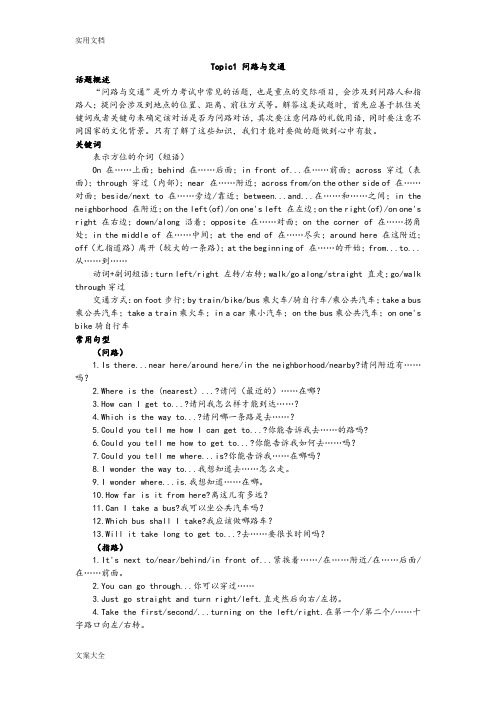
Topic1 问路与交通话题概述“问路与交通”是听力考试中常见的话题,也是重点的交际项目,会涉及到问路人和指路人;提问会涉及到地点的位置、距离、前往方式等。
解答这类试题时,首先应善于抓住关键词或者关键句来确定该对话是否为问路对话,其次要注意问路的礼貌用语,同时要注意不同国家的文化背景。
只有了解了这些知识,我们才能对要做的题做到心中有数。
关键词表示方位的介词(短语)On 在……上面;behind 在……后面;in front of...在……前面;across 穿过(表面);through 穿过(内部);near 在……附近;across from/on the other side of 在……对面;beside/next to 在……旁边/靠近;between...and...在……和……之间;in the neighborhood 在附近;on the left(of)/on one's left 在左边;on the right(of)/on one's right 在右边;down/along 沿着;opposite 在……对面;on the corner of 在……拐角处;in the middle of 在……中间;at the end of 在……尽头;around here 在这附近;off(尤指道路)离开(较大的一条路);at the beginning of 在……的开始;from...to...从……到……动词+副词短语:turn left/right 左转/右转;walk/go along/straight 直走;go/walk through穿过交通方式:on foot步行;by train/bike/bus乘火车/骑自行车/乘公共汽车;take a bus 乘公共汽车;take a train乘火车;in a car乘小汽车;on the bus乘公共汽车;on one's bike骑自行车常用句型(问路)1.Is there...near here/around here/in the neighborhood/nearby?请问附近有……吗?2.Where is the (nearest)...?请问(最近的)……在哪?3.How can I get to...?请问我怎么样才能到达……?4.Which is the way to...?请问哪一条路是去……?5.Could you tell me how I can get to...?你能告诉我去……的路吗?6.Could you tell me how to get to...?你能告诉我如何去……吗?7.Could you tell me where...is?你能告诉我……在哪吗?8.I wonder the way to...我想知道去……怎么走。
初中英语听力最常考的30个对话情景_中考英语
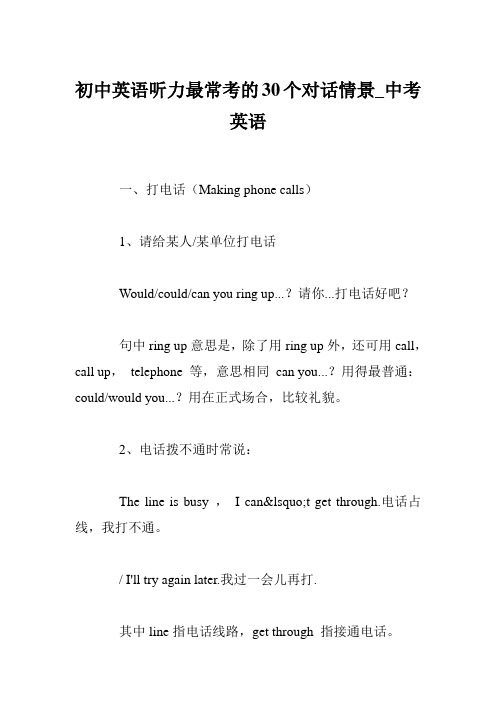
初中英语听力最常考的30个对话情景_中考英语一、打电话(Making phone calls)1、请给某人/某单位打电话Would/could/can you ring up...?请你...打电话好吧?句中ring up意思是,除了用ring up外,还可用call,call up,telephone 等,意思相同can you...?用得最普通:could/would you...?用在正式场合,比较礼貌。
2、电话拨不通时常说:The line is busy ,I can‘t get through.电话占线,我打不通。
/ I'll try again later.我过一会儿再打.其中line指电话线路,get through 指接通电话。
3、电话拨通后相互打招呼:Hello,(name or telephone number)你好,(并通报本人的姓名或单位名称或电话号码)Hello,is that...speaking?你是...吗?/ Who is that speaking/calling?你是谁?/ Who is speaking/calling,please?你是谁?应答时常说:Yes,(this is)...speaking. 是的,我是..../ Yes,it‘s...here. 我是....4、打电话请对方找人或留言:Is...in/at home?某某在家吗?/ Can/may/could I speak to...,please?请...接电话好吗?/ Will/would you give a message to...,please?请给...捎个口信好吗?/ Would you tell him my telephone number,please?请你把我的电话号码告诉他好吗?/ Can/could you ask...to ring me back,please?请叫...给我回个电话好吗?应答时常说:Hold on/Wait a minute/One moment,please. 请等一等/ I‘m sorry...is not in./at home now.对不起,...现在不在/ Can I take a message?我能给你捎口信好吗?/ Does he have your telephone number?他有你的电话号码吗?/ I'll ask him to call you back. 我叫他给你回电话二、劝告和建议(Advice and suggestion)1、You‘d better (not)do sth... 你最好(不)干..../ You should do sth. 你应该干..../ You need(to)do sth. 你需要干....2、Why don‘t you do sth?为什么不..../ Why not do sth?为什么不....这是以反问的方式提出劝告或建议,含有建议对方去干某事的意思,而不是询问对方为何不去干某事的原因.3、What/How about +名词或动名词...?这种句型表达随便的建议,有征求对方意见的意思,多数情况下是建议和对方一起做某事。
干货整理:初中英语听力16大场景话题全汇总!

干货整理:初中英语听力16大场景话题全汇总!听力是很多同学考试的失分项,毕竟英语听力播放次数有限,一旦漏听或听不懂,根本没有机会再听一次,这也造成了很多同学在考听力时的紧张心态。
实际上听力一般都有固定的问答模式、题型,如果能够提熟悉这些听力中常出现的语境,对于考试具有很大的帮助。
下面班班老师汇总了初中英语听力考试中16大场景话题。
拿走拿走别客气~Topic 1:问路与交通1) 关键词:动词+副词短语:turn left/right 左转/右转;walk/go along/straight 直走;go/walk through 穿过交通方式:on foot 步行;by train/bike/bus 乘火车/骑自行车/乘公共汽车;take a bus 乘公共汽车;take a train 乘火车;on the bus 乘公共汽车;on one's bike 骑自行车2) 经典例句(问路)1.Excuse me.Is there a bank near here?打扰一下,这附近有银行吗?2.Which is the way to the supermarket?请问哪一条路是去超市的?3.Do you know the way to Bridge Street?你知道去布里奇大街的路吗?4.Would you please tell me the way to the bank?请问你能告诉我去银行怎么走吗?5.Could you tell me how I can get to the hotel?你能告诉我如何去旅馆吗?(指路)1.Yes,there is.It's on Center Street.是的,有。
在中心街。
2.It's in front of the library.它在图书馆前面。
3.Go down this street.沿着这条街走。
4.Turn left at the first crossing.在第一个十字路口左转。
英语中考考点

初中英语中考考点总结中考听力常考话题请求允许常见句型:Shall we...?_Good idea!Can I...?_No way.Can you help me? _Sure. 校园日常生活常见句型:What are you reading...? I’m reading about water.How long have you been at this school?_Two and a half years.What do you do before you go to school in the morning?_I wash my face,then eat breakfast.就餐常见句型:What would you like to eat?Some chicken,please!What would you like to drink? Get me a cold coke,please!What would you like? _Some cookies.爱好及习惯常见句型:What’ your hobby?....is my favorite.How about you?What’s your favorite sport?My favorite sport is...?谈论时间与日期常见句型:Which season does...like best?I like winter best.When is the...exam? On Tuesday完形填空常考话题:话题1 发表观点——个人成长话题2 个人经历及感受话题3 英语学习话题4 事物介绍阅读理解常考话题:A篇话题1 人物经历及感受话题2 特殊人物类介绍话题3 校园学习话题4 跨文化介绍B篇话题1 海报信息话题2 广告信息话题3 旅游信息C篇话题1 发表观点——个人成长话题2 咨询建议话题3 教育学习话题4 特殊人物类介绍话题5 跨文化介绍话题6 事物发展史话题7 实物介绍任务型阅读常考话题:话题1 现代科技话题2 社会教育及文化话题3 特殊人物类介绍书面表达常考类型话题1 观点类话题2 做法类话题3 校园生活类初中英语中考考点大汇总1 (see 、hear 、notice 、find 、feel 、listen to 、look at (感官动词)+ doing e.g :I like watching monkeys jump2 (比较级and 比较级):表示越来越怎么样3 a piece of cake =easy 小菜一碟(容易)补:a place of interest 名胜4 agree with s.b 赞成某人5 all kinds of 各种各样a kind of 一种6 all over the world = the whole world=around the world=through the world整个世界7 along with 同……一道,伴随…… e.g : I will go along with you 我将和你一起The students planted trees along with their teachers 学生同老师们一起种树8 As soon as 一怎么样就怎么样9 as you can see 你是知道的10 ask for ……求助向…要…(直接接想要的东西)e.g : ask you for my book11 ask s.b for sth 向某人要什么12 ask s.b sth询问某人某事ask s.b to do sth叫某人做某事ask s.b not to do 叫某人不要做某事13 at the age of 在……岁时e.g:I am sixteen I am at the age of sixteen14 at the beginning of …… ……的起初;……的开始15 at the end of +地点/+时间最后;尽头;末尾e.g : At the end of the day16 at this time of year 在每年的这个时候补:at least 至少17 be /feel confident of sth /that clause +从句感觉/对什么有信心,自信e.g : I am / feel confident of my spoken English I feel that I can pass the test18 be + doing 表:1 现在进行时2进行时态表将来时19 be able to (+ v 原) = can (+ v 原)能够…… e.g : She is able to sing She can sing 补base on 以…(为)根据20 be able to do sth 能够干什么e.g :she is able to sing 21 be afraid to do (of sth 恐惧,害怕…… e.g. : I'm afraid to go out at night.22 be allowed to do 被允许做什么e.g: I'm allowed to watch TV 我被允许看电视I should be allowed to watch TV 我应该被允许看电视23 be angry with s.b 生某人的气e.g : Don't be angry with me24 be angry with(at) s.b for doing sth 为什么而生某人的气25 be as…原级…as 和什么一样e.g : She is as tall as me 她和我一样高26 be ashamed to do 耻于做某事27.be +距离+away from 距某地有多远28 be away from 从……离开29 be bad for 对什么有害e.g : Reading books in the sun is bad for your eyes 在太阳下看书对你的眼睛不好30 be born 出生于31 be busy doing sth 忙于做什么事be busy with sth 忙于……32 be careful=look out 当心;小心be close to… 离…很近33 be different from…… 和什么不一样34 be famous for 以……著名35 be friendly/kind to s.b 对某人友好36 be from = come from 来自e.g :He is from Beijing He comes from Beijing Is he from Beijing ? Does he come from Beijing ?37 be full of 装满……的be filled with 充满e.g: The glass is full of water. The glass is filled with water38 be glad+to+do/从句很高兴做什么39 be going to + v(原)将来时40 be good at(+doing) = do well in 在某方面善长, 善于……41 be good for 对什么有好处e.g : Reading aloud is good for your English42 be happy to do 很高兴做某事43 be helpful to s.b 对某人有好处e.g : Reading aloud is helpful to you 大声朗读对你有好处Exercising is helpful to your body 锻炼对你的身体有好处44 be in good health 身体健康45 be in trouble 处于困难中e.g : She is in trouble They are in trouble46 be interested in 对某方面感兴趣47 be late for = come late to 迟到e.g: Be late for class 上课迟到48 be like 像…… e.g : I'm like my mother49 be mad /angry at 生某人的气50 be made from由……制成(制成以后看不出原材料) 补:be made in 在…生产或制造51 be made of 由……制成(制成以后还看得见原材料)52 be not sure 表不确定53 be on a visit to 参观54 be popular with s.b 受某人欢迎补:be pleased with 对…感到满意55 be quiet 安静56 be short for 表**的缩写e.g: 陶is short for 陶俊杰57 be sick in bed 生病在床58 be sorry to do sth be sorry for s.b e.g : I am sorry for you59 be sorry to hear that60 be sorry to trouble s.b e.g : I am sorry to trouble you61 be strict in doing sth 严于做某事e.g : He's strict in obeying rules62 be strict with s.b 对某人要求严格e.g: Some students are not strict with them selves 这些学生对自己不严格63 be strict with s.b in sth 某方面对某人严格64 be supposed to do 被要求干什么65 be sure 表确定66 be sure of doing sth 对做某事有信心e.g: He is sure of winning I am sure of learning English well67 be sure of sth 对做某事有信心e.g: I'm sure of my head (my teacher) 我相信我的大脑(老师)68 be sure that sth 对做某事有信心e.g: I'm sure that he can pass the test 我相信他能通过考试69 be sure to do sth 一定会做某事e.g: We are sure to pass the test 我们一定会通过这次考试We are sure to learn English well 我们一定能学好英语70 be terrified of + 名/动doing 害怕……71 be terrified to do sth 害怕做某事72 be the same as … 和什么一样73 be used to doing sth 习惯做某事e.g: My father is used to getting up early 我爸爸习惯早起He is used to sleeping in class 他习惯上课睡觉He is used to working hard. He is used to hard work 他习惯努力工作74 be worth doing 值得做什么75 be(feel) afraid to do sth 害怕做某事be afraid of sth 害怕某物be afraid that 丛句76 because+句子because of +短语e.g : He was late because he had a headache He was late because of his headache77 begin to do = start to do 开始做某事start…with…=begin…with… 以什么开始什么e.g : Let's begin the game with the song . I begin to go home78 between…and… 两者之间79 borrow sth from s.b 向……借…… lend sth to s.b ( lend s.b sth 借给……什么东西e.g : I borrowed a pen from him. He lent a pen to me ( he lent me a pen80 both = the same(as) = not different(from) 表相同81 bother 打扰bother s.b to do sth 补:both…and… …和…都eg : I'm sorry to bother you ,but can you tell me the way to the station 我十分道歉打扰你,但是你能告诉我怎么去车站The problem has been bothering me for weeks 这个问题困扰了我几个周了He's bothering me to lend him money82 by the end of 到……为止83 call s.b sth e.g : We call him Old Man84 care about 关心e.g : Don't you care about this country's future ?你为什么不关心国家的未来85 catch up with s.b 赶上某人86 chat with s.b 和某人闲谈take s.b to + 地点带某人去某地87 come in 进来88 come over to 过来89 come up with 提出e.g: Can you come up with a good idea 你能想出一个好办法吗?90 communicate with s.b 和某人交流91 consider + doing 考虑做什么e.g : Why not consider going to LuZhou 为什么不考虑去泸州?92 dance to 随着……跳舞e.g : She likes dancing to the music 她喜欢随着音乐跳舞93 decide to do sth 决定做某事94 do a survey of 做某方面的调查95 do better in 在……方面做得更好补:do well in 在……方面干的好96 do wrong 做错补:drop off 放下(某物)97 Don't forget to do sth 不要忘了做某事98 Don't mind +doing /从句/名词不要介意……99 each +名(单)每一个…… e.g : Each student has many books 每一个学生都有一些书100 end up +doing 结束做某事101 enjoy +doing 喜欢102 escape from 从……逃跑e.g: The prisoners have escaped from the prison 犯人从监狱里逃跑出来Some gas is escaping from the pipe 有一些气体从管子里冒出103 expect to do sth 期待做某事104 fall down 摔下来fall off 从哪摔下来105 fall in love with s.b /sth 爱上什么106 far from 离某地远e.g : The school is far from my home107 find +it +adj +to do 发现做某事怎么样108 find s.b/sth +adj 发现什么怎么样?e.g : I find the book interesting109 finish 完成+doing(名词)110 fit to s.b = be fit for s.b 适合某人111 forget to do 没有做而忘了forget doing 做了而又忘了e.g: Don't forget to go home I forget closing door112 from…to… 从某某到某某e.g: From me to her113 get /have sth done做完,被(别人)做…… e.g: I have my hair cut 我理了发(头发被剪了)Tom got his bad tooth pulled out 汤母把他的坏牙拔掉了(被牙医拔掉了)114 get a part-time job = find a part-time job115 get along well with s.b = get on well with s.b 与某人相处得好116 get along with s.b = get on with s.b 与某人相处117 get ready for = be ready for 为什么而准备e.g : I get ready for math .I am ready for math 补:get…back 退还…118 get s.b into trouble 给某人麻烦119 get s.b to do sth 让某人做某事get out of 从…取出120 get…from… 从某处得到某物121 give a talk 做报告e.g: He is giving a talk122 give sth to s.b give s.b sth 给某人某物123 go fishing 钓鱼go swimming 游泳补:go over 过一遍;仔细检查124 go on to do 去做下一件事go on doing 继续做这件事125 go out away from go out of126 go to school 上学(用于专业的)go to the school 去学校(不一定是上学)127 good way to sth/do sth好方法128 hate to do 讨厌没做过的事hate doing 讨厌做过的事129 have a party for s..b 举办谁的晚会130 have a talk 听报告谈一谈131 have been doing 现在完成进行时e.g : You have been talking. You have been sleeping since then132 have been to …( 地方)……去过某过地方have gone to …(地方)去了某地还没回来had better(not) do sth 最好(不要)做某事133 have fun +doing 玩得高兴134 have sth to do 有什么事要做e.g: I have a lot of homework to do 我有很多家庭作业要做I have nothing to do 我没什么事情做135 have to do sth 必须做某事have sth done 请某人做某事136 have trouble (problem) (in) doing sth 做什么事情有麻烦137 have…time +doing have no time to do sth 没有时间做某事138 have…(时间)…off 放……假e.g: I have a month off 我请一个月得假139 hear s.b +do/doing 听见某人做某事/正在做某事140 help a lot 很大用处141 help s.b with sth \one's sth 帮助某人某事(某方面)help s.b (to) do sth 帮助某人做某事142 hope to do sth 希望做某事143 How about(+doing) = What about(+doing)144 how do you like = what do you think of 你对什么的看法145 if : 是否=whether e.g: I don't know if (whether) I should go to the party 我不知道我是否应该去参加晚会. He don't know if (whether) we will arrive on time tomorrow morning 他不知道我们明天早上是否能准时到达146 if :如果,假如(全部接一般时态)+条件语态从句e.g: I'll go to LuZhou if it doesn't rain 假如明天不下雨,我就去泸州If they change the plan they will let me know 假如他们要改变计划,他们会让我知道的I'll go to England ,if I have enough money next year 如果我明年有足够的钱,我就要去英国。
北京市中考听力常考话题
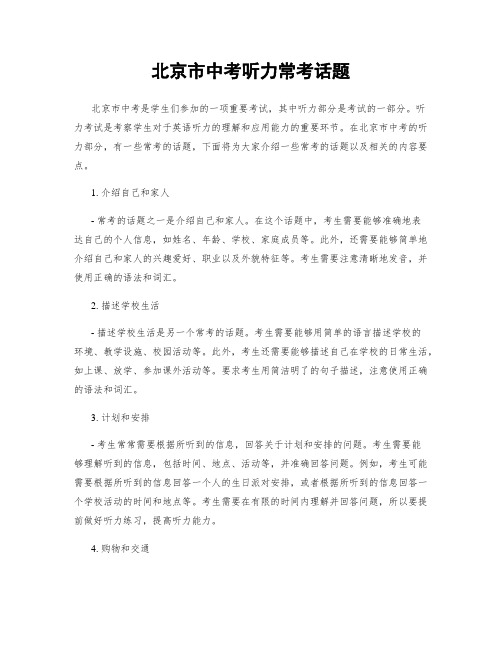
北京市中考听力常考话题北京市中考是学生们参加的一项重要考试,其中听力部分是考试的一部分。
听力考试是考察学生对于英语听力的理解和应用能力的重要环节。
在北京市中考的听力部分,有一些常考的话题,下面将为大家介绍一些常考的话题以及相关的内容要点。
1. 介绍自己和家人- 常考的话题之一是介绍自己和家人。
在这个话题中,考生需要能够准确地表达自己的个人信息,如姓名、年龄、学校、家庭成员等。
此外,还需要能够简单地介绍自己和家人的兴趣爱好、职业以及外貌特征等。
考生需要注意清晰地发音,并使用正确的语法和词汇。
2. 描述学校生活- 描述学校生活是另一个常考的话题。
考生需要能够用简单的语言描述学校的环境、教学设施、校园活动等。
此外,考生还需要能够描述自己在学校的日常生活,如上课、放学、参加课外活动等。
要求考生用简洁明了的句子描述,注意使用正确的语法和词汇。
3. 计划和安排- 考生常常需要根据所听到的信息,回答关于计划和安排的问题。
考生需要能够理解听到的信息,包括时间、地点、活动等,并准确回答问题。
例如,考生可能需要根据所听到的信息回答一个人的生日派对安排,或者根据所听到的信息回答一个学校活动的时间和地点等。
考生需要在有限的时间内理解并回答问题,所以要提前做好听力练习,提高听力能力。
4. 购物和交通- 考生需要具备购物和交通的听力理解能力。
在购物方面,考生需要能够听懂关于商品的描述,包括颜色、大小、价格等,并准确回答问题。
在交通方面,考生需要能够理解有关交通工具的信息,如乘坐地铁或公交车的路线、车票价格等,并回答相关的问题。
考生需要具备理解数字和地点的能力,同时要注意对听力材料的细节把握。
5. 旅行和景点- 旅行和景点也是常考的话题。
考生需要能够听懂关于旅行计划和景点介绍的信息,并能够回答相关问题。
例如,考生可能需要根据听到的信息回答某个旅游景点的位置、开放时间、门票价格等。
要求考生在听力材料中获取关键信息,并做好笔记,以便回答问题时能够准确无误。
中考英语听力题常见30个情景对话及常用语汇总
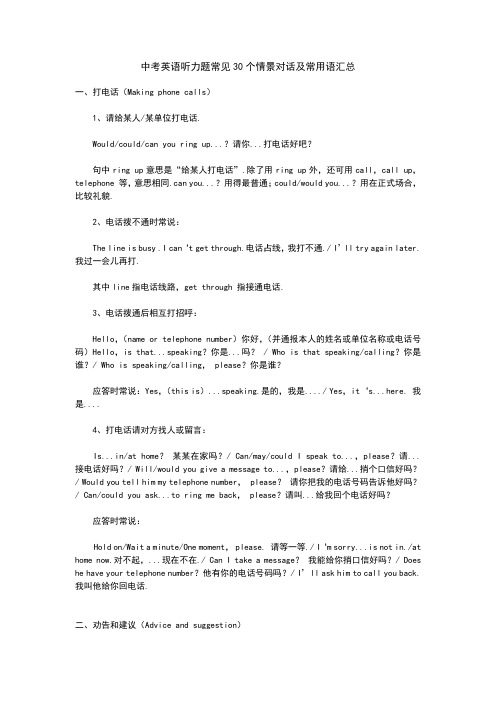
4、打电话请对方找人或留言:
Is...in/at home? 某某在家吗?/ Can/may/could I speak to...,please?请...接电话好吗?/ Will/would you give a message to...,please?请给...捎个口信好吗? / Would you tell him my telephone number, please? 请你把我的电话号码告诉他好吗?/ Can/could you ask...to ring me back, please?请叫...给我回个电话好吗?
3、What/How about +名词或动名词...? 这种句型表达随便的建议,有征求对方意见的意思,多数情况下是建议和对方一起做某事.
4、“Shall we...?”这种句型用于建议对方与自己一起做什么,是一种普通的表示建议的方法.它和“Let‘s...,shall we?”句型可以互换,在回答时,如果赞成这个建议,常用“Yes, let's.”或“OK. let’s.”
2、间接问候
1.Please give one‘s(one’s 代表不同人称的物主代词(如: my, our... 等) regards/best wishes/ love to.../ Please remember me to sb.请向某人问好./请向某人致意.
2.“Say hi/hello to...(from me)”意为“向...致意/问候”.这相当于Please give my best regards/wishes to...(请代我向...问好)的意思.
【中考复习】2021年中考英语听力常考题型整理:表允许和回答用语
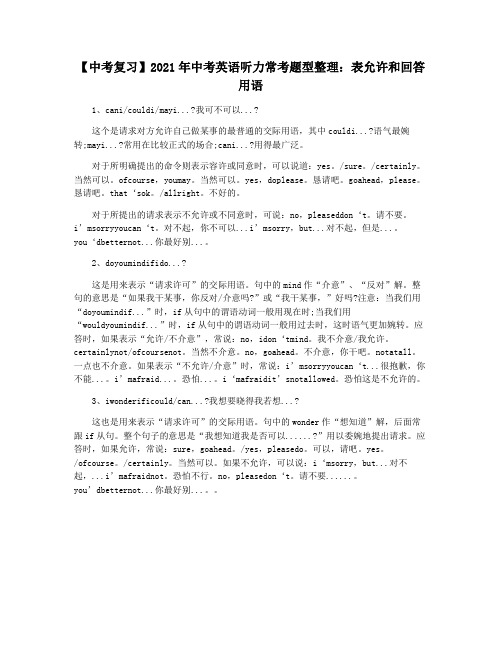
【中考复习】2021年中考英语听力常考题型整理:表允许和回答用语1、cani/couldi/mayi...?我可不可以...?这个是请求对方允许自己做某事的最普通的交际用语,其中couldi...?语气最婉转;mayi...?常用在比较正式的场合;cani...?用得最广泛。
对于所明确提出的命令则表示容许或同意时,可以说道:yes。
/sure。
/certainly。
当然可以。
ofcourse,youmay。
当然可以。
yes,doplease。
恳请吧。
goahead,please。
恳请吧。
that‘sok。
/allright。
不好的。
对于所提出的请求表示不允许或不同意时,可说:no,pleaseddon‘t。
请不要。
i’msorryyoucan‘t。
对不起,你不可以...i’msorry,but...对不起,但是...。
you‘dbetternot...你最好别...。
2、doyoumindifido...?这是用来表示“请求许可”的交际用语。
句中的mind作“介意”、“反对”解。
整句的意思是“如果我干某事,你反对/介意吗?”或“我干某事,”好吗?注意:当我们用“doyoumindif...”时,if从句中的谓语动词一般用现在时;当我们用“wouldyoumindif...”时,if从句中的谓语动词一般用过去时,这时语气更加婉转。
应答时,如果表示“允许/不介意”,常说:no,idon‘tmind。
我不介意/我允许。
certainlynot/ofcoursenot。
当然不介意。
no,goahead。
不介意,你干吧。
notatall。
一点也不介意。
如果表示“不允许/介意”时,常说:i’msorryyoucan‘t...很抱歉,你不能...。
i’mafraid...。
恐怕...。
i‘mafraidit’snotallowed。
恐怕这是不允许的。
3、iwonderificould/can...?我想要晓得我若想...?这也是用来表示“请求许可”的交际用语。
中考英语听力常考话题共15个话题.docx
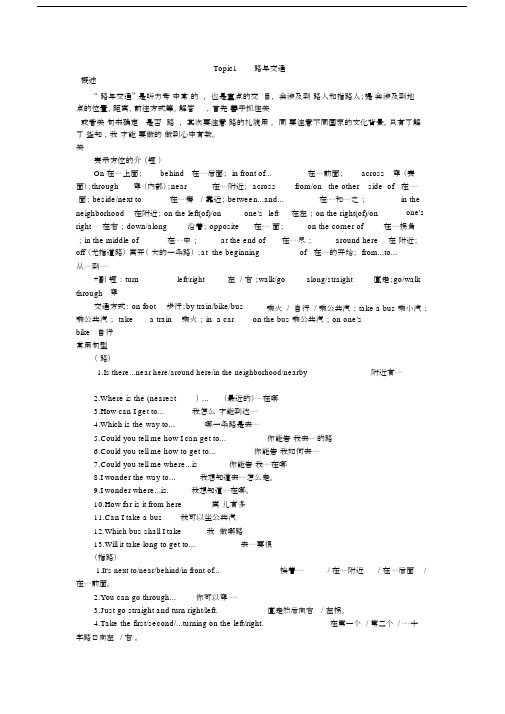
Topic1路与交通概述“ 路与交通” 是听力考中常的,也是重点的交目,会涉及到路人和指路人;提会涉及到地点的位置、距离、前往方式等。
解答,首先善于抓住关或者关句来确定是否路,其次要注意路的礼貌用,同要注意不同国家的文化背景。
只有了解了些知,我才能要做的做到心中有数。
关表示方位的介(短)On 在⋯⋯上面;behind在⋯⋯后面;in front of...在⋯⋯前面;across穿(表面);through穿(内部);near在⋯⋯附近;across from/on the other side of在⋯⋯面; beside/next to在⋯⋯旁/靠近;between...and...在⋯⋯和⋯⋯之;in the neighborhood在附近; on the left(of)/on one's left在左; on the right(of)/on one's right 在右; down/along沿着;opposite在⋯⋯面;on the corner of在⋯⋯拐角; in the middle of在⋯⋯中;at the end of在⋯⋯尽;around here在附近;off (尤指道路)离开(大的一条路);at the beginning of在⋯⋯的开始;from...to...从⋯⋯到⋯⋯+副短: turn left/right左 / 右;walk/go along/straight直走;go/walk through穿交通方式: on foot步行;by train/bike/bus 乘公共汽; take a train乘火;in a car bike 自行乘火 / 自行 / 乘公共汽; take a bus 乘小汽;on the bus 乘公共汽; on one's常用句型(路)1.Is there...near here/around here/in the neighborhood/nearby附近有⋯⋯2.Where is the (nearest)...(最近的)⋯⋯在哪3.How can I get to...我怎么才能到达⋯⋯4.Which is the way to...哪一条路是去⋯⋯5.Could you tell me how I can get to...你能告我去⋯⋯的路6.Could you tell me how to get to...你能告我如何去⋯⋯7.Could you tell me where...is你能告我⋯⋯在哪8.I wonder the way to...我想知道去⋯⋯怎么走。
中考英语听力训练材料(含答案解析)
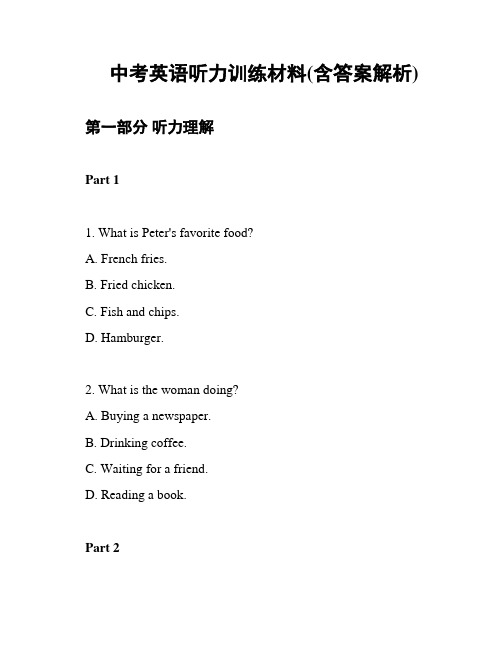
中考英语听力训练材料(含答案解析)第一部分听力理解Part 11. What is Peter's favorite food?A. French fries.B. Fried chicken.C. Fish and chips.D. Hamburger.2. What is the woman doing?A. Buying a newspaper.B. Drinking coffee.C. Waiting for a friend.D. Reading a book.Part 23. What is the relationship between the speakers?A. Teacher and student.B. Doctor and patient.C. Boss and employee.D. Mother and son.4. What is the woman's problem?A. She lost her phone.B. She doesn't understand the directions.C. She doesn't have enough money.D. She doesn't have a phone.Part 35. What does the man suggest they do?A. Go to the beach.B. Go shopping.C. Go to the movies.D. Go to the park.6. What does the woman think of the suggestion?A. She doesn't like it.B. She thinks it's a good idea.C. She has another idea.D. She's not sure.第二部分听力技能Part 17. How long has the man been studying Chinese?A. One year.B. Two years.C. Three years.D. Four years.8. What did the woman do last weekend?A. She watched a movie.B. She went shopping.C. She went to a concert.D. She visited a museum.Part 29. What does the man suggest the woman do first?A. Take a shower.B. Brush her teeth.C. Change her clothes.D. Have breakfast.10. What does the woman want to do after breakfast?A. Go shopping.B. Go for a walk.C. Listen to music.D. Watch TV.答案解析1. C:由于该题信息是在具体品种的介绍后出现,需要同学们对听取的文本有足够的理解和记忆才能听出来。
中考英语听力常考话题%28精确整理%29
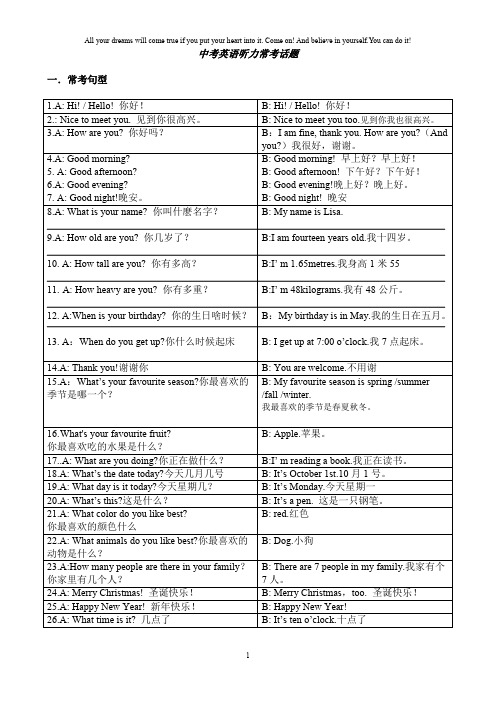
中考英语听力常考话题一.常考句型1.A: Hi! / Hello! 你好!B: Hi! / Hello! 你好!2.: Nice to meet you. 见到你很高兴。
B: Nice to meet you too.见到你我也很高兴。
3.A: How are you? 你好吗?B:I am fine, thank you. How are you?(Andyou?)我很好,谢谢。
4.A: Good morning?5. A: Good afternoon?6.A: Good evening?7. A: Good night!晚安。
B: Good morning! 早上好?早上好!B: Good afternoon! 下午好?下午好!B: Good evening!晚上好?晚上好。
B: Good night! 晚安8.A: What is your name? 你叫什麽名字?9.A: How old are you? 你几岁了?10. A: How tall are you? 你有多高?11.A: How heavy are you? 你有多重?12. A:When is your birthday? 你的生日啥时候?13. A:When do you get up?你什么时候起床B: My name is Lisa.B:I am fourteen years old.我十四岁。
B:I’ m 1.65metres.我身高1米55B:I’ m 48kilograms.我有48公斤。
B:My birthday is in May.我的生日在五月。
B: I get up at 7:00 o’clock.我7点起床。
14.A: Thank you!谢谢你B: You are welcome.不用谢15.A:What’s your favourite season?你最喜欢的季节是哪一个?B: My favourite season is spring /summer /fall /winter.我最喜欢的季节是春夏秋冬。
中考英语听力常见题型解析三十种高频话题单词及对话解析
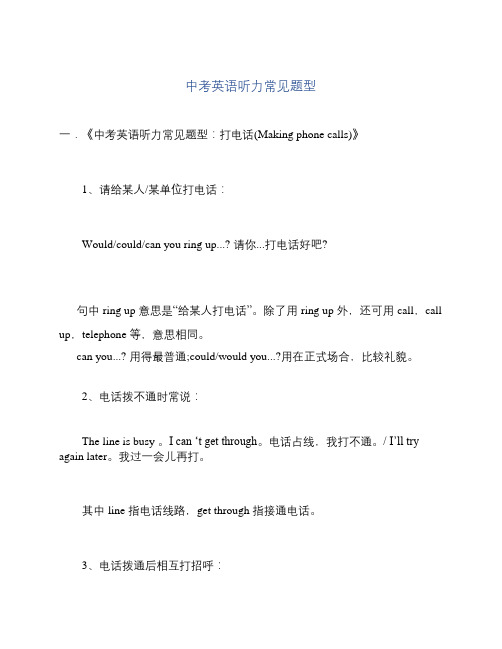
中考英语听力常见题型一.《中考英语听力常见题型:打电话(Making phone calls)》1、请给某人/某单位打电话:Would/could/can you ring up...? 请你...打电话好吧?句中ring up 意思是“给某人打电话”。
除了用ring up 外,还可用call,call up,telephone 等,意思相同。
can you...? 用得最普通;could/would you...?用在正式场合,比较礼貌。
2、电话拨不通时常说:The line is busy 。
I can ‘t get through。
电话占线,我打不通。
/ I’ll try again later。
我过一会儿再打。
其中line 指电话线路,get through 指接通电话。
3、电话拨通后相互打招呼:Hello,(name or telephone number)你好,(并通报本人的姓名或单位名称或电话号码)Hello,is that...speaking?你是...吗? / Who is that speaking/calling? 你是谁?/ Who is speaking/calling,please?你是谁?应答时常说:Yes,(this is)...speaking。
是的,我是...。
/ Yes,it‘s...here。
我是...。
4、打电话请对方找人或留言:Is...in/at home? 某某在家吗?Can/may/could I speak to...,please? 请...接电话好吗?Will/would you give a message to...,please? 请给... 捎个口信好吗? / Would you tell him my telephone number,please? 请你把我的电话号码告诉他好吗?/Can/could you ask...to ring me back,please? 请叫...给我回个电话好吗?应答时常说:Hold on/Wait a minute/One moment,please。
中考英语听力常考话题及填空高频词
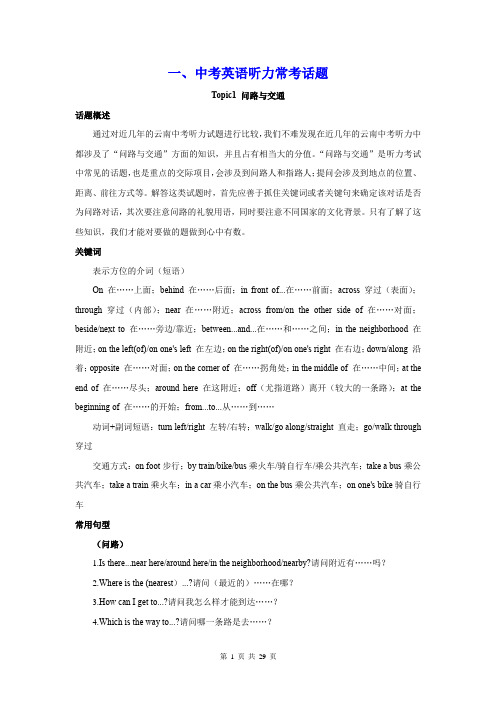
一、中考英语听力常考话题Topic1 问路与交通话题概述通过对近几年的云南中考听力试题进行比较,我们不难发现在近几年的云南中考听力中都涉及了“问路与交通”方面的知识,并且占有相当大的分值。
“问路与交通”是听力考试中常见的话题,也是重点的交际项目,会涉及到问路人和指路人;提问会涉及到地点的位置、距离、前往方式等。
解答这类试题时,首先应善于抓住关键词或者关键句来确定该对话是否为问路对话,其次要注意问路的礼貌用语,同时要注意不同国家的文化背景。
只有了解了这些知识,我们才能对要做的题做到心中有数。
关键词表示方位的介词(短语)On 在……上面;behind 在……后面;in front of...在……前面;across 穿过(表面);through 穿过(内部);near 在……附近;across from/on the other side of 在……对面;beside/next to 在……旁边/靠近;between...and...在……和……之间;in the neighborhood 在附近;on the left(of)/on one's left 在左边;on the right(of)/on one's right 在右边;down/along 沿着;opposite 在……对面;on the corner of 在……拐角处;in the middle of 在……中间;at the end of 在……尽头;around here 在这附近;off(尤指道路)离开(较大的一条路);at the beginning of 在……的开始;from...to...从……到……动词+副词短语:turn left/right 左转/右转;walk/go along/straight 直走;go/walk through 穿过交通方式:on foot步行;by train/bike/bus乘火车/骑自行车/乘公共汽车;take a bus乘公共汽车;take a train乘火车;in a car乘小汽车;on the bus乘公共汽车;on one's bike骑自行车常用句型(问路)1.Is there...near here/around here/in the neighborhood/nearby?请问附近有……吗?2.Where is the (nearest)...?请问(最近的)……在哪?3.How can I get to...?请问我怎么样才能到达……?4.Which is the way to...?请问哪一条路是去……?5.Could you tell me how I can get to...?你能告诉我去……的路吗?6.Could you tell me how to get to...?你能告诉我如何去……吗?7.Could you tell me where...is?你能告诉我……在哪吗?8.I wonder the way to...我想知道去……怎么走。
最新中考英语_【2021中考听力话题素材】(三)
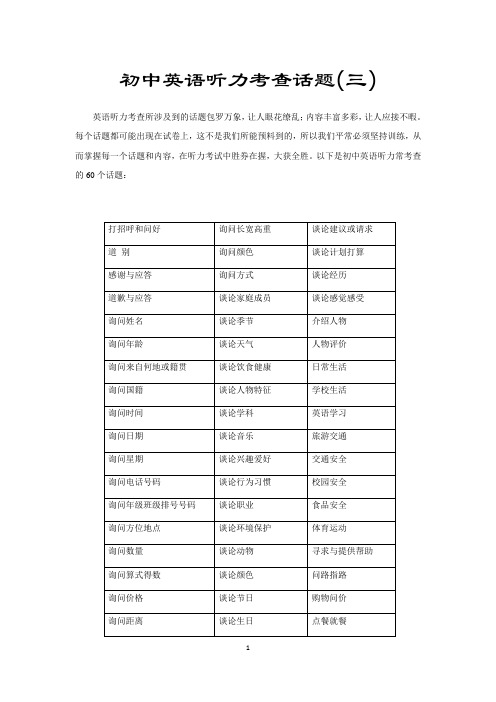
初中英语听力考查话题(三)英语听力考查所涉及到的话题包罗万象,让人眼花缭乱;内容丰富多彩,让人应接不暇。
每个话题都可能出现在试卷上,这不是我们所能预料到的,所以我们平常必须坚持训练,从而掌握每一个话题和内容,在听力考试中胜券在握,大获全胜。
以下是初中英语听力常考查的60个话题:听力话题素材(三)41 谈论建议或请求Let’s set up an English Club. 让我们建立一个英语俱乐部。
That’s a good idea.这是个好主意。
You should often watch English movies. 你应该经常看英语电影。
You must run every morning. 你必须每天早晨跑步。
You’d better go to school by bike. 你最好骑自行车上学。
You can eat more fruit. 你可以多吃些水果。
How about going for a ride? 去兜兜风怎么样?What about going out with me tomorrow? 明天和我一起出去怎么样?What do you think of going out for dinner? 你觉得出去吃晚饭怎么样?Why don’t you take part in his birthday party? 你为什么不参加他的生日聚会呢?Could/ Would you please help me? 你能帮帮我吗?Could/ Would you please give me a hand? 你能帮我一下吗?Shall we stop talking about her? 我们不说她了好不好?42 谈论计划打算What are you going to do this afternoon? 今天下午你打算干什么?I’m going to d o my homework. 我打算做作业。
- 1、下载文档前请自行甄别文档内容的完整性,平台不提供额外的编辑、内容补充、找答案等附加服务。
- 2、"仅部分预览"的文档,不可在线预览部分如存在完整性等问题,可反馈申请退款(可完整预览的文档不适用该条件!)。
- 3、如文档侵犯您的权益,请联系客服反馈,我们会尽快为您处理(人工客服工作时间:9:00-18:30)。
中考英语听力常考话题一、30句日常用语1. A: Hi! / Hello! 你好!B: Hi! / Hello! 你好!2. A: Nice to meet you. 见到你很高兴。
B: Nice to meet you too.见到你我也很高兴。
3. A: How are you? 你好吗?B:I am fine, thank you. How are you?(And you?)我很好,。
4. A: Good morning? B: Good morning! 早上好?早上好!5. A: Good afternoon? B: Good afternoon! 下午好?下午好!6.A: Good evening? B: Good evening!晚上好?晚上好。
7. A: Good night!晚安。
B: Good night! 晚安8. A: What is your name? 你叫什麽名字?B: My name is Lisa.9. A: How old are you? 你几岁了?B:I am fourteen years old.我十四岁。
10. A: How tall are you? 你有多高?B:I’ m 1.65metres.我身高1米5511. A: How heavy are you? 你有多重?B:I’ m 48kilograms.我有48公斤。
12. A: When is your birthday? 你的生日是什么时候?B:My birthday is in May.我的生日在五月。
13. A:When do you get up?你什么时候起床。
B: I g et up at 7:00 o’clock.我7点起床。
14.A:When do you do morning exercise? 你什么时候做早操?B: I usually you do morning exercise at 8:30.我通常在8:30做早操。
15. A: Thank you!你 B: You are welcome.不用16.A:What’s your favourite season?你最喜欢的季节是哪一个?B: My favourite season is spring/summar/fall/winter.我最喜欢的季节是春夏秋冬。
17.A: What's your favourite fruit?你最喜欢吃的水果是什么?B: Apple.苹果。
18.A: When is Children’s day?儿童节是什么时候? B: It’ s in June.在六月19.A: What are you doing?你正在做什么?B:I’ m reading a book.我正在读书。
20A: What’s the date today?今天几月几号B: It’s October 1st.10月1号。
A: What day is it today?今天星期几?B: It’s Monday.今天星期一21. A: What’s this?这是什么?B: It’s a pen. 这是一只钢笔。
22.A: What color is it?这是什么颜色?B: It’s red.红色23.A: What color do you like best?你最喜欢的颜色什么?B: red.红色24.A: What animals do you like best?你最喜欢的动物是什么?B: Dog.小狗25. A: Happy New Year! 新年快乐!B: Happy New Year!26. A:Happy birthday! 生日快乐!B:Thank you!27. A: Merry Christmas! 圣诞快乐!B: Merry Christmas,too. 圣诞快乐!28. A: Are you OK? B: Yes, I am OK. 你还好吗?我挺好的。
29. A: What time is it? 几点了B: It’s ten o’clo ck.十点了30.A:How many people are there in your family?你家里有几个人?B: There are 7 people in my family.我家有个7人。
二、16个话题(Topics)Topic1 问路与交通经典例句(问路)1.Excuse me.Is there a bank near here?打扰一下,这附近有银行吗?2.Which is the way to the supermarket?请问哪一条路是去超市的?3.Do you know the way to Bridge Street?你知道去布里奇大街的路吗?4.Would you please tell me the way to the bank?请问你能告诉我去银行怎么走吗?5.Could you tell me how I can get to the hotel?你能告诉我如何去旅馆吗?(指路)1.Yes,there is.It's on Center Street.是的,有。
在中心街。
2.It's in front of the library.它在图书馆前面。
3.Go down this street.沿着这条街走。
4.Turn left at the first crossing.在第一个十字路口左转。
5.It's on Bridge Street on the right.在布里奇大街的右边。
Topic2 感与应答经典例句(感)1.Thanks for asking me out.你邀请我。
2.Thank you!!3.Thanks!!4.Thanks a lot!多!5.Thank you very much!非常感!6.Many thanks!多!7.It's very kind of you.你真是太好了。
8.How kind of you!你真好!9.Thank you anyway.仍然你。
10.Thank you all the same.仍然你。
(应答)1.Don't mention it.不客气。
2.That's all right.不客气。
3.It was nothing.不客气。
4.That's OK.不客气。
5.Think nothing of it.不客气。
6.You're welcome.不客气。
7.Not at all.不客气。
8.It's a pleasure.别客气。
9.My pleasure.别客气。
Topic3 请求与建议经典句型1.—Would you mind not smoking here?你介意不在这抽烟吗?—Sorry,I won't.对不起,我不会了。
2. —Would you like something to drink?来点喝的好吗?—Yes,please.好的。
3.—Don't smoke here.请不要在这里抽烟。
—Sorry,I won't.对不起,我不会了。
4.—Why not go to movies with us?你为什么不和我们一块儿看电影去呢?—Sounds great.听起来不5.—Could you please take out the trash?你去倒一下垃圾好吗?—Sorry,mum.I'm doing my homework.对不起,妈妈。
我正在做作业。
Topic4 问候与告别经典例句1.—How are you?你好吗?—Fine, thank you. And you?好,。
你呢?—I'm fine, too.我也很好。
2.—How do you get on with your classmates?你和你同学相处得怎样?—Very well.很好。
3.—See you.再见。
—See you.再见。
Topic5 祝愿与祝贺经典例句(当某人取得成功时)—I have passed the examination!我已经通过考试了—Congratulations (to you)!祝贺你!(当某人外出旅行时)1.Good luck with you trip!祝您旅途平安!2.Have a good trip/journey.=I wish you a good trip/journey.祝你旅途愉快。
/祝你一路顺风。
3.Good trip to you./Nice journey to you.祝你旅途愉快。
(当某人生日时)—Happy birthday to you!生日快乐!—Thank you!!(当某人即将做某事时)—I will take the exams tomorrow.我明天将参加考试。
—Good luck(to you)!(I wish you success!) 祝您顺利!(祝您成功!)(在公共节日里)—Happy New Year(to you)!(祝你)新年快乐!—Thanks. The same to you!(Happy New Year to you,too!)!您也一样!(也祝您新年快乐!)Topic6 打话题概述1.打人自我介绍:用英语打时,开头打招呼的第一句话通常是Hello,然后便自报,再告知想与谁通话。
例如:Hello! This is Mike(speaking).2.打人要某人接,需要证实对方的身份时,不能说Are you...?或Who are you?而应该说:May/Can/Could I speak to Kate, please?/Is that Kate?/Is Kate in/at home?/Who's that?3.本人接时可以说: This is Kate (speaking)./Yes, speaking.经典例句(打请对方找人或留言)1.Can/Could/Would you ring up/call/call up...?你能给……打个吗?2.Will/Would you give a message to...,please?请你给……捎个口信可以吗?(应答)1.Can I take a message(for you)?要我帮你捎口信吗?2.I'll ask...to call you back.我会让……给你回个的。
3.This is Vivian speaking.我是Vivian。
